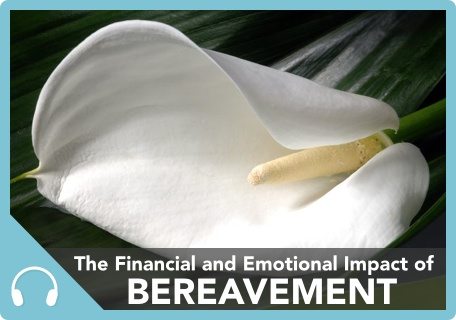 Here we are at session number 34 , and we’re going to be talking about the financial and emotional impact of bereavement. I’m going to be speaking with my friend Dennis Hall who is a financial planner from London. I’ll introduce Dennis in a minute, but he has written a book which deals – in a unique way I think – with the issues facing those left behind after the death of a loved one. He uses real-life stories gleaned from his time advising widows to bring a message that much of the financial pain of bereavement can be avoided with some forward thinking, and he does this with incredible sensitivity.
Here we are at session number 34 , and we’re going to be talking about the financial and emotional impact of bereavement. I’m going to be speaking with my friend Dennis Hall who is a financial planner from London. I’ll introduce Dennis in a minute, but he has written a book which deals – in a unique way I think – with the issues facing those left behind after the death of a loved one. He uses real-life stories gleaned from his time advising widows to bring a message that much of the financial pain of bereavement can be avoided with some forward thinking, and he does this with incredible sensitivity.
Click to Listen
Podcast: Subscribe in iTunes | Play in new window | Download
The book is called ‘Who will it hurt when I die?’ and it is available from Amazon here.
I’m mixing things up a little this week, acting on the advice of a listener called Howard who suggested that I dive straight into the meat of each session and leave announcements and things to the end. I’ll be going over this week’s reviews and other things after the interview with Dennis, so hang on till the end for that. I’l be interested to see if you think it works too. Howard also suggested I drop the stings between sections, or at least get the levels right. I’ve always felt like they were a bit of an afterthought, so they’ve been retired – I’m sure you don’t mind!
 Sponsor Message
Sponsor Message
This podcast is brought to you with the help of Seven Investment Management, a firm of investment managers based in London. They put their name to my show and to my site and videos because they believe in what I’m doing, and I’m very grateful for their support. You can see what they’re up to at 7im.co.uk
Introduction
At some point in all our lives we will be affected by the death of someone we know and love. Obviously this has far-reaching emotional ramifications for those left behind – these are unavoidable. But there are financial ramifications too, many of which can be thought through in advance and in many cases, difficulties can be avoided. The two elements are intertwined though, and not separate. Finance and emotions work together and are affected by each other.
Rather than say any more now, I’m going to go straight to the interview. I’ll be back afterwards, but enjoy this – it’s a good one.
Interview
As a rule, I don't transcribe the interviews as it just takes too long, so please do listen to the full interview. Below are the rough questions which I asked Dennis:
- What prompted you to write a book about bereavement and its effects?
- What are the most common implications of death that you have come across? (intestacy, head-in-the-sand etc)
- What are some of the effects you have seen on those left behind?
- Can you explain the process of what happens to a person's estate on death?
- What about pensions? And business assets? Are these dealt with differently?
- What role do trusts have to play? Aren't they just for rich people?
- What is the first thing someone should do to prepare their affairs for their own passing? – Financial Audit
- How big a deal is Inheritance Tax? What can I do to reduce this?
- What can I do to organise my finances in such a way that if the worst happens, things are made easy for my executors?
- Do I need professional executors or attorneys? Whom should I choose?
- Any last suggestions?
- Where can listeners get the book?
OK, I hope you found the interview with Dennis Hall helpful. Death and bereavement is such a difficult subject to tackle but I think he has done a masterful job in his book.
Again, the book is called “Who Will It Hurt When I Die?” and is available from Amazon here. I urge you to check it out, even if it is not for yourself, but for someone older in your life who needs to know this stuff in order to be prepared for ‘that day.’
Remember you can find out more about Dennis and the work he does at yellowtail.co.uk.
As ever, if you have any questions you can leave them in the comments section of the shownotes or leave me a voicemail question by clicking the link on the far right of this page.
This week’s reviews
Another 5* review this week, this time from Aquilastar who says:
“I intend to maintain my subscription to this podcast. I have learned so much by listening to each podcast and I like to go back and listen again. Pete speaks in a language and uses practical examples that I understand. I have had many a ‘lightbulb’ moment since listening. I like the way he also explains both sides of an issue so that the listener is helped to arrive at a suitable next steps conclusion”
That’s very kind Aquilastar and I’m glad this stuff is practical. After all, if it’s just theory, it’s not a lot of use to anyone. Practical application is what matters after all.
I’m now up to 47 reviews, and I’m itching to get up to 50 so please do consider leaving me a review if this information is helpful to you. You can do that by going to meaningfulmoney.tv/iTunes. This helps others to hear about the show and to subscribe, because it keeps me near the top of the rankings.
Last week I cleared 1700 downloads of the podcast in one week, a record by nearly 300. Next stop: 2000! I'm so grateful for everyone who is subscribing and listening – let me know if there's anything I can do for you…
Outro
I hope you enjoyed this session. Next time we'll be talking about major changes to pensions in the workplace. Everyone who is an employee of a company is affected by this and you need to know about it. I’ll be interviewing Chris Daems and Matthew Walne, adviser friends of mine who are very active in this area right now and have a lot of wisdom to offer.
If you have any questions about this, go to meaningfulmoney.tv/feedback and leave a voicemail
Thanks for listening – I'll talk to you next time



Leave a Reply